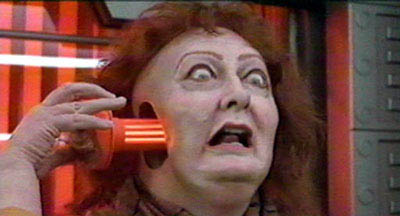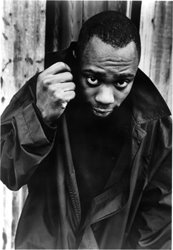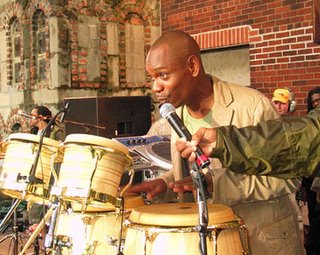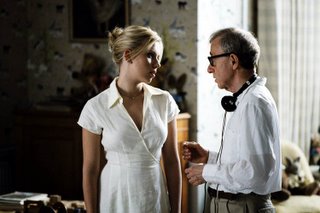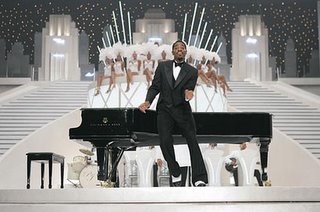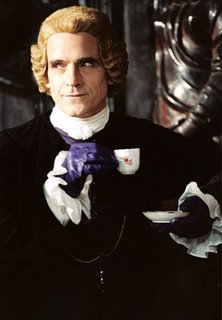Still looking...
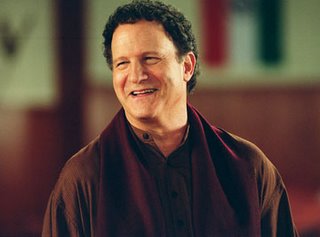
Albert Brooks' new film, Looking For Comedy in the Muslim World, contains one of the single least funny, most painful "comedic" scenes I have ever seen. Brooks is in India, researching what makes Muslims laugh for the United States government. He holds his own stand-up show and tells bad jokes and no one laughs. He asks if the people in the audience speak English. They do. He continues to bomb. They don't laugh. The scene is at least ten minutes long and at least nine minutes longer than it has to be to make its point.
But, then, I'm not fully convinced Brooks knows what his point is. Who, for example, is he making fun of in Looking For Comedy? Is he making fun of the Indians for not having a sense of humor? Yeah, kind of. Is he making fun of himself for having the hackiest material this side of a Gallagher showcase? Yeah, to a degree. Is he making fun of the U.S. government for sending Albert Brooks to the Middle East but sending him to India instead of Iraq or Iran? Hell, anything's possible.
Though the vast majority of critics would disagree with me, this is par for the course when it comes to Albert Brooks, perhaps the most lavishly overpraised comedy director of all time. I have nothing against Brooks, but time and time again, I fail to see what the fuss is about.
My friend and fellow film fanatic Mike Anderson, a Brooks fan, wrote an interesting piece on his blog, Tativille, about the film. He does his best to praise Looking For Comedy but ultimately he concedes that it pales compared to the new Woody Allen film, Match Point.
The comparison got me thinking that nearly all the criticisms leveled against Woody Allen all apply to Albert Brooks, yet Brooks get an inexplicable pass while Allen gets crapped on over and over. This is not to say the criticism are not relevant to Allen's work — increasingly, Allen seems to read his bad press and make the movies most likely to antagonize his critics — but merely to observe a certain critical double-standard when evaluating the two.
We hear "Woody Allen always plays Woody Allen," and he does. But so does Albert Brooks, with a great deal less variation. Where Woody has played Woody as a South American dictator, a Russian peasant, a history-observing chameleon, and a fast-talking Broadway agent, Albert has played film director Albert Brooks (Real Life), a film editor (Modern Romance), an executive (Lost in America), an executive (Defending Your Life), a writer (Mother), a screenwriter (The Muse), and film director Albert Brooks (Looking For Comedy in the Muslim World).
We hear "Woody Allen portrays women as one-dimensional man-crazed shrews. It's a fair point (at times), but, once again, we find it just as appropriate to Brooks. In Lost in America, Brooks' plans of dropping out of society and living a transitory life are spoiled by his seemingly lovely wife (Julie Hagerty), who loses her mind in Vegas and blows their entire life savings in one night at the roulette wheel, which allows Brooks' character to taunt, mock, and berate the Hagerty character, whose flaws are never excused or explained. Mrs. Yeager (Frances Lee McCain) in Real Life, with her ungodly menstrual cramps, mood swings, eagerness to cheat on her husband (with Brooks, naturally), is equally unsavory. Brooks' Indian female assistant in Looking For Comedy doesn't understand the concept of sarcasm. It's not that she just doesn't laugh, she is incapable of comprehending it until Brooks explains it to her. Is Albert Brooks really trying to tell us that people in India have never heard of sarcasm?!?
Why does Albert Brooks get such a steep curve on the grading scale of movie reviews? Consider this quote from a review of his film Mother, written by critic James Berardinelli:
"In the forumula-laden playground of modern comedies, Mother comes as a breath of fresh air. Unlike most of 1996's so called "laugh fests", this one relies on smart humor rather than slapstick, puns, and dumb jokes with quick payoffs. Brooks doesn't use the Airplane! approach to comedy. His films aren't loaded with hit-and-miss gags. The director/writer strives for quality over quantity, and when he wants the audience to laugh they generally do so."
Listen to the subtle generosity of that statement. "Quality over quantity" means this is a comedy without many jokes. "When he wants them to laugh they generally do so" means lots of his jokes are, contrary to his earlier sentence, hit or miss. These are nice ways of saying the movie is a comedy that isn't funny, and, illogically, it seems that when a comedy isn't funny it means it must somehow be more important or better than one that does (Hence the sideways dig at Airplane!, a movie several dozen times more funny than Brooks' Real Life, with just as much to say about moviemaking, formulaic screenplays, and general Hollywood stupidity).
Give Brooks credit: he's a very good actor for other directors, particularly in James L. Brooks' Broadcast News. But he makes better movie ideas than movies. The ideas behind Real Life are brilliant and ahead of their time. The idea behind Looking For Comedy is arguably the funniest of any movie of the last twelve months. But the films themselves are frequently chores: shallow, repetitive, and, yes, full of ideas whose potential is never attained (like those great helmet cameras in Real Life that seem destined for a great fall-out-of-your-seat physical gag that never materializes). His movies are better described briefly by someone who has seen them than actually watched. For such a vaunted artist, he is, ironically, best appreciated by his loglines. I'm afraid I have to side with India: Albert Brooks just isn't that funny.


